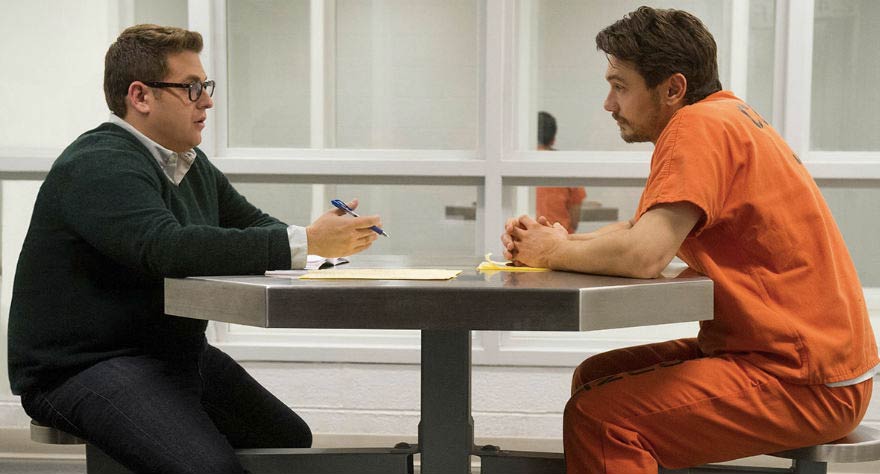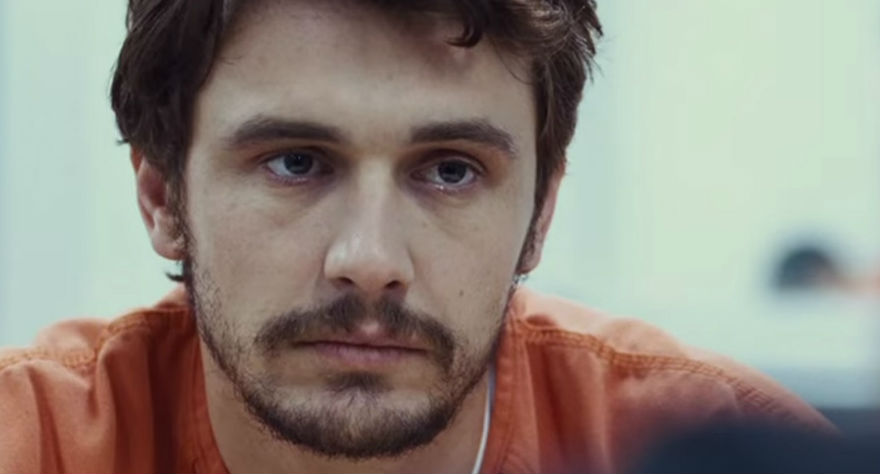
The truth is unappealing and self-serving in this true crime tale.

The truth is unappealing and self-serving in this true crime tale.
There’s always a level of filtration, or Hollywoodization, that happens in reality-based films. There’s no getting around it, really. It’s storytelling, and the truth can always be embellished and beautified, or uglied and undermined, depending on the writer/director’s whims. True Story is indeed a true story, but it isn’t the stranger-than-fiction elements of the narrative that detract from how good the film could have been. Instead what distracts from an essentially intriguing cat-and-mouse tale is the poor casting and obviously narcissistic angle the film is presented from. An ironic criticism, I know, in that a film based on a memoir (Michael Finkel’s True Story: Murder, Memoir, Mea Culpa) would seem the most forgiven for a certain level of narcissism. But director Rupert Goold (known for his theatrical direction and making his film directorial debut) can’t seem to detach from Finkel’s egocentric intentions.
The true story of True Story lies in the tale of Michael Finkel (Jonah Hill), a high-rising and adventurous journalist with The New York Times Magazine, or at least up until 2001 when it came to light that Mike had fabricated the bulk of a cover article he wrote for the magazine, leading to his dismissal and being blacklisted in his industry. He’s deep in the throes of depression from this momentous career failure, retreating to his home in Montana with his girlfriend Jill (Felicity Jones), when he receives a call from a small-time reporter in rural Oregon. A man, Christian Longo (James Franco), has been taken in and accused of murdering his wife and three children. He had been traveling under the name Michael Finkel, claiming to be the journalist. Intrigued by anyone who would want to take on his identity, especially at a time when his name feels so entirely sullied, Mike reaches out to Longo. The two begin to meet and a friendship of sorts ignites.
Finkel is drawn to Longo’s resistance to be forthright with the truth, seeing him as a journalistic challenge. Longo finds Finkel to be inspiring and draws on his writing skills and insights as he navigates his path toward trial. Perhaps the two seek affirmation and possible redemption in one another? Finkel starts work on a book about Longo and their relationship, thinking that if he truly devotes himself to the pursuit of truth he can somehow find his way back to credibility. Longo continues to string Finkel on, eventually getting to trial where his side of the story finally comes out and inevitabilities are revealed.

Hill tries to imbue Finkel with a certain amount of innocence, which feels disingenuous based on the existence of Finkel’s memoir and this film. A competitive journalist doesn’t seem very likely to have been so taken in by a small-town sociopath, thus the performance just doesn’t quite add up. His ego may have blinded him in real life, but Hill’s portrayal implies it as more related to Finkel’s personal road to atonement.
Franco, who I’d normally call chameleonic with his ability to meld into most genres, is actually more unbelievable in this role than Hill is for the opposite reason. Whereas Hill puts too much innocence into Finkel, Franco could use a heavy dose of it for Longo, who he never plays as remotely virtuous—even falsely so—in a way that might garner the trust of the audience. This just makes us question further the believability of Mike holding any hope in the truth of what Longo tells him. It makes it hard not to expect Hill and Franco to jump into their usual on-screen fare and crack a few jokes just to see them do something together that makes more sense.
Felicity Jones makes up 75 percent of the reason to see the film. Her role is minimal but adds the only real hint of true emotion and genuine reaction in the film. She gets one scene face-to-face with Franco and somehow manages to steal the entire show with it. She’s an absolute wonder.
Goold seems to have fallen prey to the charms of Mr. Finkel, falling for the story rather than the facts. The story of a journalist uncovering the layers of an accused murderer while finding his own way back to what truth really is would be interesting. But that’s not what True Story is. It’s one man’s continued search for affirmation and attention, a man who ultimately meets someone just like himself who plays the same game, only against him. So he writes a book and gets the final word. It’s na-na-nah-boo-boo with adults. You can almost see Finkel put his thumbs in his ears, wave his fingers around and stick out his tongue mischievously.
So, what ultimately makes True Story an interesting watch is the viewer being allowed to pass detached judgement, not just on a murderer, but on a man egotistical enough to think that being taken advantage of makes him unique or entitles him to anything. A man entirely blind to his own hubris. There’s a certain satisfaction in passing judgement on someone who claims that “truth is always important,” when what he obviously means is “the story is always important.”
The film’s ending would suggest Finkel wasn’t altogether pleased with the way things played out—no one wants to be taken for a shmuck—but neither do audiences, and it’s not clear if Mr. Finkel understands that satisfaction from his memoir stems from seeing both he and Longo get the justice coming to them. And that’s why the movie isn’t a failure, and is even (maybe inadvertently) appealing. If Goold had thought to approach the self-serving subject matter with more awareness, the added layer may have made it so the film was in on the joke instead of being the punchline, but that’s the unpredictability of a true story, is it not?